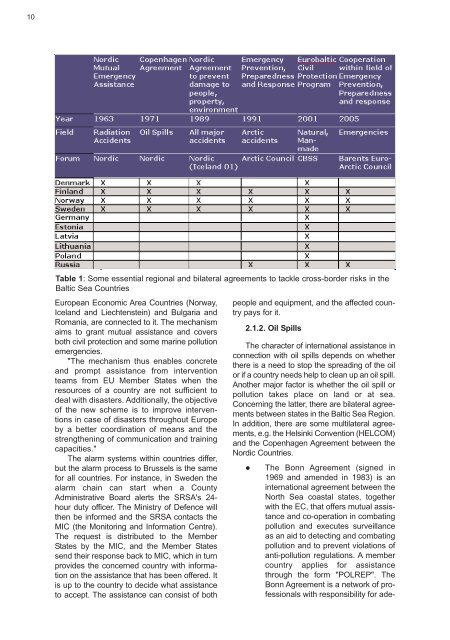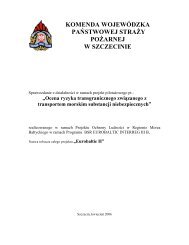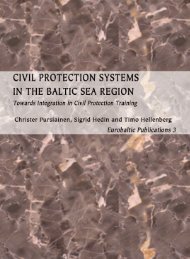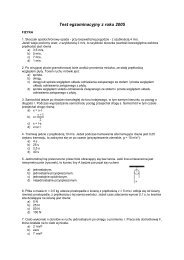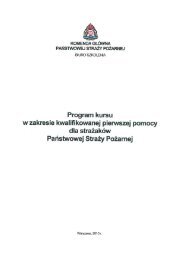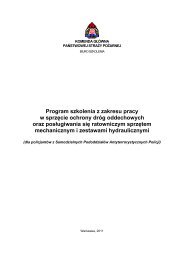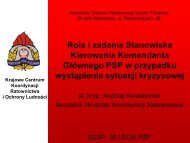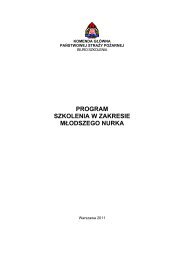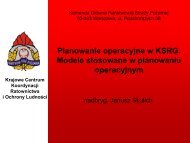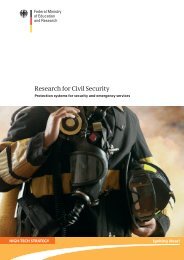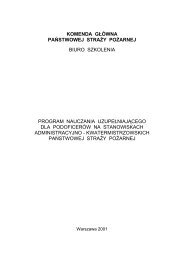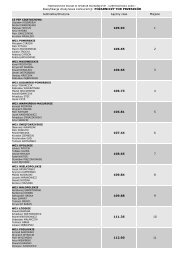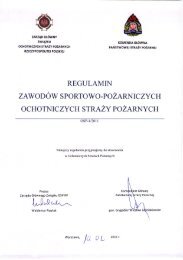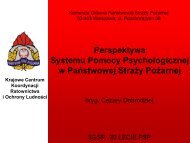Cross-Border Risks in the Baltic Sea Region: Lessons to ... - Helsinki.fi
Cross-Border Risks in the Baltic Sea Region: Lessons to ... - Helsinki.fi
Cross-Border Risks in the Baltic Sea Region: Lessons to ... - Helsinki.fi
You also want an ePaper? Increase the reach of your titles
YUMPU automatically turns print PDFs into web optimized ePapers that Google loves.
10<br />
Table 1: Some essential regional and bilateral agreements <strong>to</strong> tackle cross-border risks <strong>in</strong> <strong>the</strong><br />
<strong>Baltic</strong> <strong>Sea</strong> Countries<br />
European Economic Area Countries (Norway,<br />
Iceland and Liechtenste<strong>in</strong>) and Bulgaria and<br />
Romania, are connected <strong>to</strong> it. The mechanism<br />
aims <strong>to</strong> grant mutual assistance and covers<br />
both civil protection and some mar<strong>in</strong>e pollution<br />
emergencies.<br />
"The mechanism thus enables concrete<br />
and prompt assistance from <strong>in</strong>tervention<br />
teams from EU Member States when <strong>the</strong><br />
resources of a country are not suf<strong>fi</strong>cient <strong>to</strong><br />
deal with disasters. Additionally, <strong>the</strong> objective<br />
of <strong>the</strong> new scheme is <strong>to</strong> improve <strong>in</strong>terventions<br />
<strong>in</strong> case of disasters throughout Europe<br />
by a better coord<strong>in</strong>ation of means and <strong>the</strong><br />
streng<strong>the</strong>n<strong>in</strong>g of communication and tra<strong>in</strong><strong>in</strong>g<br />
capacities."<br />
The alarm systems with<strong>in</strong> countries differ,<br />
but <strong>the</strong> alarm process <strong>to</strong> Brussels is <strong>the</strong> same<br />
for all countries. For <strong>in</strong>stance, <strong>in</strong> Sweden <strong>the</strong><br />
alarm cha<strong>in</strong> can start when a County<br />
Adm<strong>in</strong>istrative Board alerts <strong>the</strong> SRSA's 24-<br />
hour duty of<strong>fi</strong>cer. The M<strong>in</strong>istry of Defence will<br />
<strong>the</strong>n be <strong>in</strong>formed and <strong>the</strong> SRSA contacts <strong>the</strong><br />
MIC (<strong>the</strong> Moni<strong>to</strong>r<strong>in</strong>g and Information Centre).<br />
The request is distributed <strong>to</strong> <strong>the</strong> Member<br />
States by <strong>the</strong> MIC, and <strong>the</strong> Member States<br />
send <strong>the</strong>ir response back <strong>to</strong> MIC, which <strong>in</strong> turn<br />
provides <strong>the</strong> concerned country with <strong>in</strong>formation<br />
on <strong>the</strong> assistance that has been offered. It<br />
is up <strong>to</strong> <strong>the</strong> country <strong>to</strong> decide what assistance<br />
<strong>to</strong> accept. The assistance can consist of both<br />
people and equipment, and <strong>the</strong> affected country<br />
pays for it.<br />
2.1.2. Oil Spills<br />
The character of <strong>in</strong>ternational assistance <strong>in</strong><br />
connection with oil spills depends on whe<strong>the</strong>r<br />
<strong>the</strong>re is a need <strong>to</strong> s<strong>to</strong>p <strong>the</strong> spread<strong>in</strong>g of <strong>the</strong> oil<br />
or if a country needs help <strong>to</strong> clean up an oil spill.<br />
Ano<strong>the</strong>r major fac<strong>to</strong>r is whe<strong>the</strong>r <strong>the</strong> oil spill or<br />
pollution takes place on land or at sea.<br />
Concern<strong>in</strong>g <strong>the</strong> latter, <strong>the</strong>re are bilateral agreements<br />
between states <strong>in</strong> <strong>the</strong> <strong>Baltic</strong> <strong>Sea</strong> <strong>Region</strong>.<br />
In addition, <strong>the</strong>re are some multilateral agreements,<br />
e.g. <strong>the</strong> Hels<strong>in</strong>ki Convention (HELCOM)<br />
and <strong>the</strong> Copenhagen Agreement between <strong>the</strong><br />
Nordic Countries.<br />
<br />
The Bonn Agreement (signed <strong>in</strong><br />
1969 and amended <strong>in</strong> 1983) is an<br />
<strong>in</strong>ternational agreement between <strong>the</strong><br />
North <strong>Sea</strong> coastal states, <strong>to</strong>ge<strong>the</strong>r<br />
with <strong>the</strong> EC, that offers mutual assistance<br />
and co-operation <strong>in</strong> combat<strong>in</strong>g<br />
pollution and executes surveillance<br />
as an aid <strong>to</strong> detect<strong>in</strong>g and combat<strong>in</strong>g<br />
pollution and <strong>to</strong> prevent violations of<br />
anti-pollution regulations. A member<br />
country applies for assistance<br />
through <strong>the</strong> form "POLREP". The<br />
Bonn Agreement is a network of professionals<br />
with responsibility for ade-


